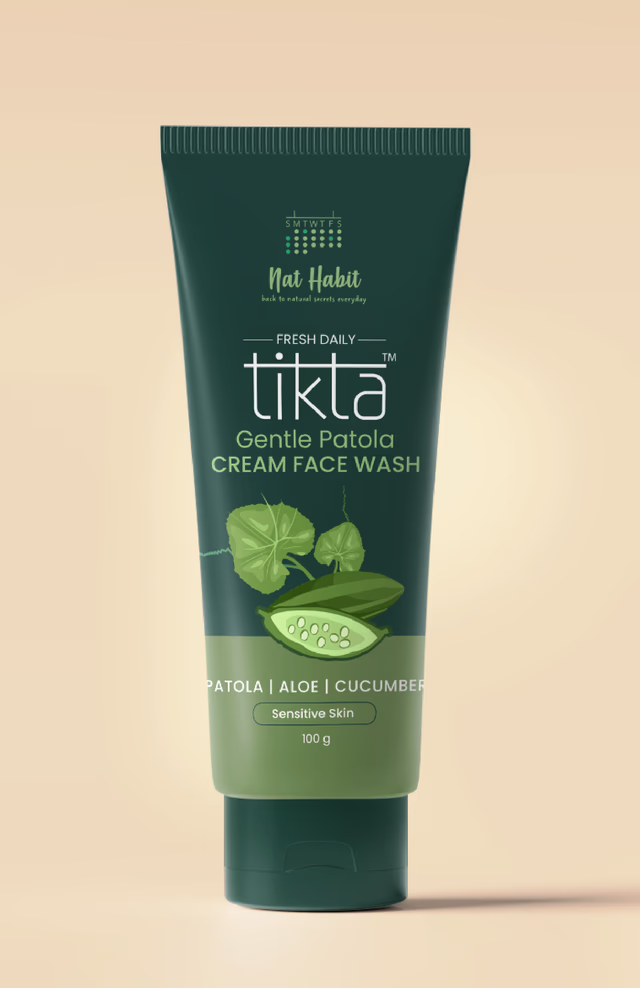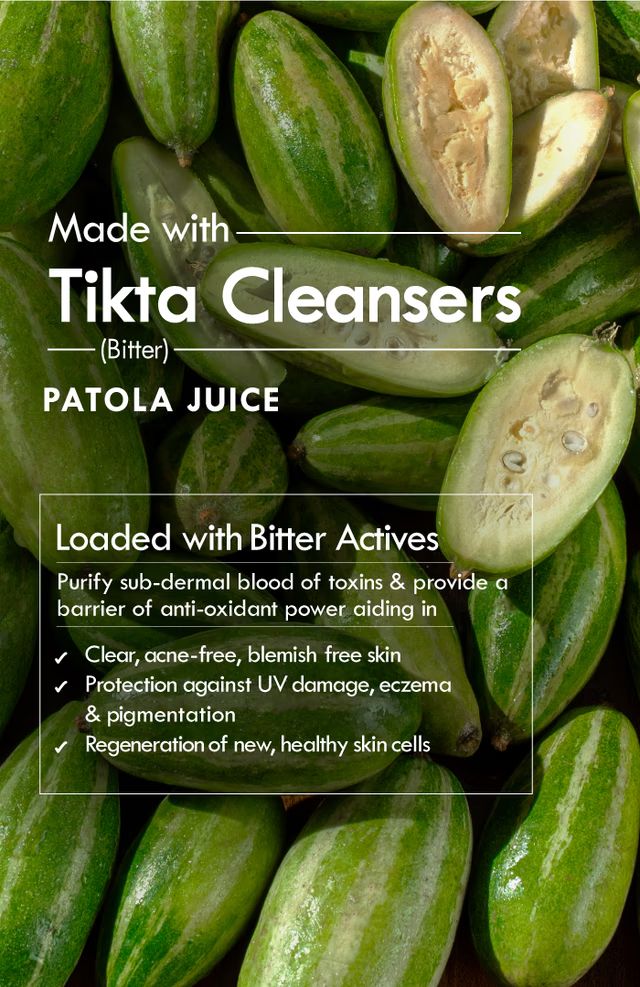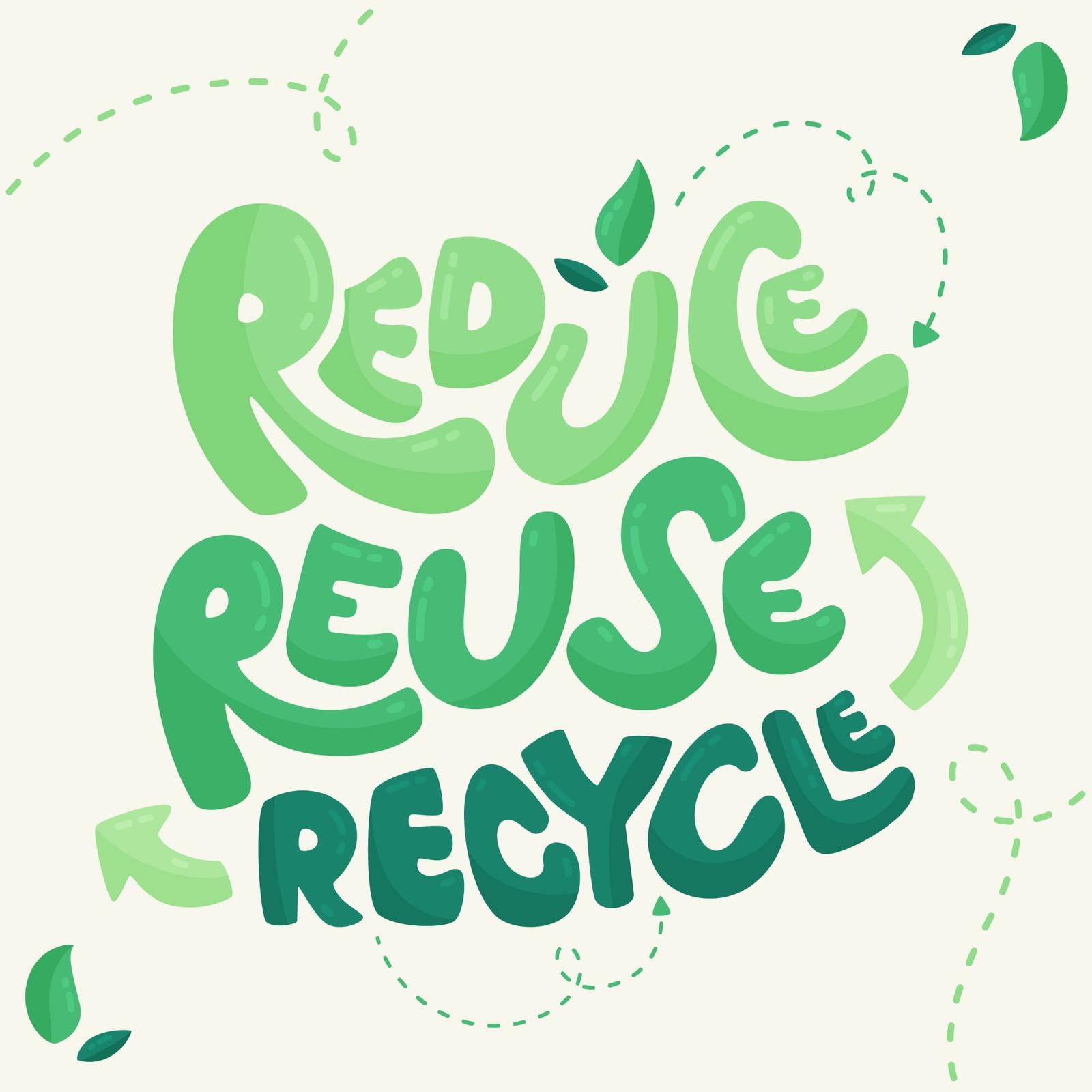Gentle Patola Tikta Cream Face Wash
Original price was: ₹328.0.₹234.0Current price is: ₹234.0.
Usage
Patch Test
Recommended on neck/face prior to first use.
Skin Types
For sensitive skin.
Pregnancy
Safe during pregnancy & lactation.
Kids
Safe for kids above 5yrs but recommended to start using regularly only after 12yrs of age.
Storage
Store away from direct heat & sunlight.
Net Weight
100 g
Expiry
Use within 6 months of Mfg Date
- Description
- Additional information
- Reviews (0)
- Q & A
- Sustainability Remark
- More Offers
- Store Policies
- Inquiries
What’s Special
Bitter Cleansing
✓ Loaded with bitter actives & natural brightening actives
✓ Deep cleanses tissues, topical layers & sub-dermal layers
✓ Purifies blood flow.
✓ Fresh raw mil cream base prevents drying after wash
✓ 100% chemical-free, sulfate free & paraben-free cleansing
Key Benefits
Regular usage helps with
-
Deeper dermal cleansing
Cleanses deeper layers of derma, flushing out toxins, rendering clarified skin.
-
Blood purification
Purifies blood, removing toxins, preventing skin infections & itchiness.
-
Non-drying cleansing
With moisturising & hydrating bio-polymers base like Farm Fresh Aloe Vera Pulp.
-
Healthy skin barrier
Stimulates keratinocytes, quickening skin healing & strengthening protective barrier.
-
Safe, damage-free cleansing
Gentle yet effective cleansing without damaging skin barrier, hence no longer term damage.
-
Acne & breakout prevention
Arrests acne causing bacteria living in topical & sub dermal layers, preventing breakouts.
-
Long term supple youth
Activates cell metabolism & fights free radicals, promoting regeneration, youthful supple skin.
Other Active Ingredients
Fresh & whole picks
Cucumber
Excellent cooling & emolliation for dry, sensitive, inflamed, irritated skin.
Raw Milk & Cream
Packed with protein, biotin, calcium & Vit B6 & D. Prevents skin from drying. Keeps skin ultra smooth and baby soft even post detox & cleanse.
Full Ingredient List: patola juice, cucumber juice, raw milk, aloe vera pulp & juice, dried patola, kokum butter, raw honey, sesame oil, olive cream, starch derived sugar, vitamin C, geranium, clary sage, xanthan gum, geogard (ecocert), capryl glucoside (derived from corn), coco glucoside (derived from coconut), decyl glucoside (derived from olive), aqua, lavender, rosemary, papaya seeds, jatamansi.
| Weight | 0.1 kg |
|---|
You must be logged in to post a review.
Q & A
Ingredients
- Natural and Organic Sources: If the face wash uses plant-based ingredients like Patola (sponge gourd) extracts, it minimizes reliance on synthetic chemicals. Natural ingredients typically require less energy-intensive manufacturing processes and are biodegradable.
- Sustainable Agriculture Practices: If the Patola and other ingredients are grown using sustainable farming practices, such as organic farming, crop rotation, and reduced pesticide use, this can significantly lower the carbon footprint associated with ingredient production.
Production Process
- Energy Efficiency: Sustainable production facilities often implement energy-efficient practices, such as using renewable energy sources (solar, wind) and optimizing manufacturing processes to reduce energy consumption.
- Water Conservation: Processes that minimize water usage and implement recycling measures can reduce the environmental impact of production.
Packaging
- Eco-friendly Packaging: Using biodegradable, recyclable, or reusable packaging materials can greatly reduce the environmental footprint. Packaging made from recycled materials or materials that can be composted helps to reduce waste and the energy required to produce new materials.
- Minimalist Packaging: Reducing the amount of packaging material used also decreases the carbon footprint by lowering the resources needed for production and transportation.
Distribution
- Local Sourcing and Manufacturing: If the ingredients are sourced locally and the product is manufactured close to the market, this reduces transportation emissions.
- Efficient Logistics: Using efficient logistics and transportation methods, such as optimizing delivery routes and using fuel-efficient vehicles, helps in reducing the carbon footprint associated with distribution.
References & Scientific Explanation
- Ingredient Sustainability:
- Plant-based ingredients often have lower lifecycle greenhouse gas emissions compared to synthetic chemicals. A study on the carbon footprint of agricultural products highlights that organic farming can reduce emissions by enhancing soil carbon sequestration and reducing the need for synthetic fertilizers (Source: Nemecek et al., "Environmental impacts of food consumption and nutrition: where are we and what is next?", 2016).
- Production Practices:
- Energy-efficient production and the use of renewable energy sources can significantly cut down greenhouse gas emissions. According to the International Energy Agency, industries adopting energy efficiency measures can reduce their carbon footprint by up to 40% (Source: IEA, "Energy Efficiency 2018").
- Packaging:
- Eco-friendly packaging solutions, like biodegradable plastics and recycled materials, have been shown to reduce carbon footprints. The Ellen MacArthur Foundation emphasizes that adopting circular economy principles in packaging can lead to substantial reductions in carbon emissions (Source: Ellen MacArthur Foundation, "The New Plastics Economy", 2016).
- Distribution:
- Local sourcing reduces transportation distances, thereby decreasing emissions. A study by Weber and Matthews (2008) found that local food systems can reduce greenhouse gas emissions by up to 4-5 times compared to non-local systems (Source: Weber and Matthews, "Food-Miles and the Relative Climate Impacts of Food Choices in the United States", 2008).
General Inquiries
There are no inquiries yet.






Reviews
There are no reviews yet.